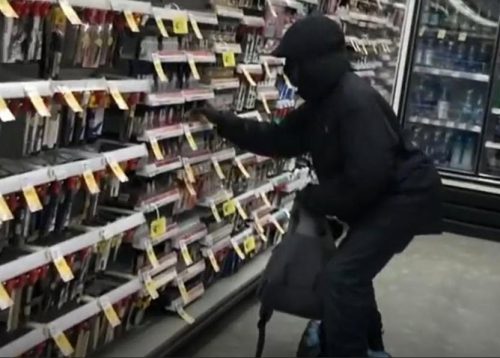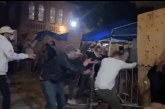

By Madison Whittemore
SACRAMENTO, CA – The California State Assembly Tuesday held its first informational hearing on organized retail theft which is an increasingly substantial issue across California counties.
The select committee on retail theft, composed of 11 assembly members, first introduced its own concerns regarding retail theft and then heard from three panels composed of retail theft experts and analysts.
Retail theft has become a viral issue dominating social media and news outlets in recent years. Now, many California assembly members, including committee chair Rick Zbur (D-Santa Monica), see retail crime as an issue “not only bad for business, but it undermines safety and the perception of safety in our communities.”
The retail crime issue has blossomed after the passing of Prop. 47 in 2014, which reduced penalties for drug possession and non-violent property crimes, responded to extreme overcrowding in state prisons, and created the misdemeanor charge of “shoplifting.”
At the start of the hearing Tuesday, Zbur immediately broached concerns regarding Prop. 47, even suggesting modifications or changes may be needed to the proposition considering current issues regarding retail theft and its prosecution.
Zbur said he wondered why many thieves are released just a few hours after being arrested and why there aren’t more consequences in place for retail theft.
As chair of the Public Safety Committee partnering with the Retail Theft Committee, assembly member Kevin McCarty (D-Sacramento) explained that while there needs to be a larger focus on “accountability,” California counties should not be overreacting with mass incarceration and just “throwing” people in jail, as theft has been dealt with in the past.
Like McCarty, other assembly members shared similar views regarding punishment of retail theft and developing action to prevent retail theft, with Assemblymember Juan Alanis (R-Merced) hoping to work towards evidence-based solutions that will provide “some hope for the future.”
Vince Fong (R-Bakersfield), another assembly member, explained how he frequently ponders over why retail theft has increased so much, with “thieves shamelessly stealing packages off of shelves…while shoppers and employees are left traumatized and terrified.”
As the committee members continued to share opening statements regarding the purpose of the hearing and their goals for decreasing retail theft, the focus began to shift towards specific California counties, with Assemblymember Mia Bonta (D-Oakland) calling out Oakland’s and Alameda’s serious struggles with retail theft among small businesses.
Bonta explained how social media has failed to accurately portray how damaging retail theft is and platforms are not “fully representing the extent of the instances of crime that we are experiencing.”
Following the opening statements by the retail theft committee, the first panel was introduced, composed of Caitlin O’Neil, from the legislative analyst’s office, and Magnus Lofstrom, from the Public Policy Institute of California (PPIC).
This panel provided an overview of relevant law surrounding retail theft and laid the foundation for discussion of possible solutions.
O’Neil broached the subject of a “wobbler,” which has become relevant under the discussion of retail theft and its charges as a misdemeanor or felony. A wobbler is a specific category of crime that can be charged as a misdemeanor or a felony.
But, as O’Neil discussed, Prop. 47 wobbler theft charges have changed, especially with the California Penal Codes now recognizing the term “shoplifting” (or stealing $950 worth of merchandise or less), as a straight misdemeanor.
Lofstrom, citing data from the California Department of Justice, highlighted several patterns across the state, also noting how the Bay Area has the highest rate of shoplifting in California.
Lofstrom explained how 2023 data will most likely be centered around “large, urban, California counties” with an emphasis on Los Angeles and San Francisco counties.
The next panel featured unique perspectives from retail workers and property owners.
Rachel Michelin, president and CEO of the California Retailers Association, delved into the perspective of retail theft from a small business owner’s perspective, especially emphasizing how retailers are grasping at any tactics to try to prevent retail theft, which, Michelin said, is not being exaggerated—as the media may suggest.
“Preventing theft and protecting our employees and customers is our top priority,” Michelin stated as she advocated for the reinstatement of Section 661—a section of the California Penal Codes that targeted repeat retail theft offenders prior to the enactment Prop. 47.
“We’re not looking to throw people in jail. We just want them to stop stealing,” Michelin concluded when discussing possible solutions that may help deter retail theft, also alluding to the fact that there is currently no deterrent in place to prevent retail theft after the passage of Prop. 47.
Similarly to Michelin, Amber Baur, Executive Director of United Food and Commercial Workers and Jeff Kreshek, a California property owner, referred to retail theft as creating a “workplace safety crisis” through “organized mobs with targeting assaults on retailers” that harm innocent civilian lives every day.
Kreshek also began to discuss the harm that retail theft has on communities as a whole.
“So the broken system chugs along…all while the lawlessness continues,” Kreshek said after explaining how stores close from theft and employees who are financially vulnerable lose their jobs and consequently their health coverage as well.
The final panel heard by the Committee for Retail Theft began with Lenore Anderson, President of Alliance for Safety and Justice.
Anderson presented the positive impacts Prop. 47 has had, referencing improvements in state prison overcrowding and decreased recidivism. However, Anderson also clarified that retail theft is “felony conduct” and was not the main focus of Prop. 47 when it was passed.
In fact, Anderson urged the committee to consider current state laws and assess current practices that are standing in the way of decreasing retail theft, asserting how only seven percent of theft cases were “cleared” or resolved in California last year, due to backlogged bench warrants and system breakdowns.
Current prosecutor, Ivy Fitzpatrick, followed up on Anderson’s discussion of assessing current practices through a collaborative approach to justice by placing more of an emphasis on intervention and “incentive for treatment.”
Fitzpatrick cited Assembly Bill 109 (AB 109), enacted in 2011, which mandated most felony offenders serve time in local jail versus state prison.
However, the prosecutor claims this has led to severe overcrowding of local jails, meaning that accused persons charged with retail theft are usually released early. As a result, with few penalties for repeat theft offenders, there’s no incentive to change.
Concluding the panel, founder of The Prosecutors Alliance, Cristine Soto DeBerry, presented a number of “upstream solutions” that are durable and will help deter criminal activity with retail theft.
“Punishment alone is not going to solve this problem,” DeBerry stated, addressing a question posed by an assembly member regarding how the fear of being caught can deter people from committing retail theft.
Instead, DeBerry encouraged law enforcement officers to pursue higher level, “dedicated investigations” that target the larger issue of retail theft and organized crime versus just single incidents.
Moreover, DeBerry asserted that in order to further shrink the opportunity for retail theft, a “kill switch” must be installed which would act by taking away the value of stolen merchandise which would then shut down the secondary markets where stolen items are resold.
DeBerry explained that by creating “traceable evidence…That will shift this whole conversation” about retail theft and its solutions.
While assembly members asserted this hearing was a good start to solving issues around retail theft, the conversation is by no means over—upcoming informational hearings are set for the Los Angeles and San Francisco areas after the new year.



